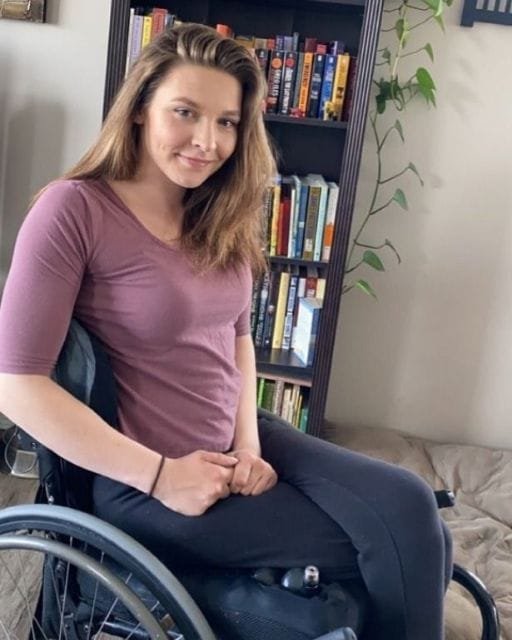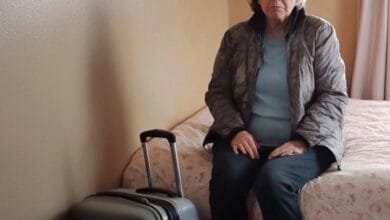I Didn’t Want a Caregiver — I Wanted My Life Back.

When they told me I’d never walk again, I didn’t cry. I just nodded, like they were giving me a weather update. Sunny skies, slight chance of paralysis. I didn’t want pity. I didn’t want to hear, “You’re so strong.” I just needed room to grieve something I couldn’t even name.
So when the nurse told me I’d need part-time help, I said no right away.
— “I’ve got it,” I told her.
But I didn’t. The kitchen was a minefield, showers were a nightmare, and every time I dropped a fork it felt like a personal failure.
Then Saara showed up.

She wasn’t what I imagined. She was younger. Not overly sweet. She didn’t treat me like I was breakable. She just walked in and said,
— “Where’s the coffee?”
And made a cup like she’d done it a hundred times.
At first, I kept her at a distance. No small talk. No personal stuff. She came, helped, and left. But eventually, I found myself laughing at her dumb jokes. I started setting aside books she might like. Sharing articles I thought she’d enjoy.
Then one day, I dropped a bowl and couldn’t reach it. That was it. I just sat there on the floor, furious. Furious at the bowl, at my legs, at the universe. Saara didn’t rush over to fix it. She sat down next to me and said,
— “It’s not about the bowl, is it?”
And something broke open.
I didn’t want a caregiver. I didn’t want help. But with her, it felt like something else. Like maybe I hadn’t lost everything. Like maybe connection wasn’t the same thing as surrender.
Then yesterday, she told me she might move.
I didn’t know what to say.
Saara sat across from me in the living room, holding a mug of tea. Hair messy, sweatshirt oversized, just like always. But her face was serious. That was new. Usually, she made jokes out of everything — spilled water became a sporting event, burnt toast a cooking disaster fit for TikTok. Not today.
Finally, she said quietly,
— “I got offered a job. Full-time. At a clinic. Structured, benefits, retirement plan. All of it.”
— “That sounds amazing,” I said, even though my throat tightened.
— “You deserve it.”
She nodded slowly.
— “It’s not here,” she added. “It’s three hours away.”
The words hung in the air like a storm. Not across the country, but far enough to feel like the end of something.
— “I see,” I said. “You can’t turn that down. You’ve earned it.”
She tilted her head.
— “Are you mad?”
— “Mad? No. Why would I be mad?” I laughed — empty. “This is great news, Saara. Really.”
But inside, I felt gutted. I wanted to scream. I wanted to ask her to stay. To tell her she mattered. That she helped me when no one else knew how. That she sat on the floor with me when I cried over a stupid bowl.
But I stayed quiet. I picked at the edge of my blanket.
When she brought it up again a few days later, I brushed it off. Told her I understood. That I was happy for her. That I’d be fine. Maybe part of that was true. But mostly, I was scared. Scared of being alone again. Scared of going back to before she came — before anyone believed sitting beside someone in silence could be enough.
Then one afternoon, while helping me sort through old photos — something I’d avoided for months — Saara paused at one picture of me on a hike. It was taken before the accident. We’d climbed a mountain, and I was sweaty, exhausted, but smiling in front of endless trees and sky.
— “You look so happy here,” she said, handing me the photo.
— “I was,” I replied, tracing the edge of the picture. “I used to love adventures. Now I can barely get to the mailbox.”
Her voice softened.
— “Do you miss it?”
— “Of course I do,” I snapped, then regretted it. “Sorry. Yeah. I do. But what does it matter? I can’t go back.”
— “No,” she said gently. “But maybe you can move forward.”
— “What does that mean?”
She leaned forward, elbows on her knees.
— “There’s an adaptive sports program nearby. Have you looked into it?”
I blinked.
— “Adaptive sports? For someone like me?”
— “For anyone who wants to try,” she said. “They’ve got wheelchair basketball, hand cycling, rock climbing. I looked it up last week. I think you’d like it.”
My heart twisted.
— “Why would you look that up?”
— “Because I care about you,” she said. “And I think you’re stronger than you think.”
I didn’t answer right away. The idea terrified me. What if I failed? What if I embarrassed myself? What if I just couldn’t do it?
But then I thought about her leaving. About sitting alone in that same room with nothing but old photos of a life I couldn’t return to. Maybe it was time to stop grieving the past — and start building something new.
A week later, Saara took me to the adaptive sports center. The gym buzzed with energy. People laughed, raced, competed. No one pitied me. No one treated me like I was broken.
We started small. I tried wheelchair basketball. I dropped the ball. I missed passes. I almost tipped over twice. But every time I made a shot, Saara cheered like I’d won gold. I left drenched in sweat and smiling wider than I had in years.
She handed me a water bottle and said,
— “Told you. You were amazing.”
— “Don’t get cocky,” I said, but I was glowing.
Over the next few weeks, I dove into it. I played ball, rode a hand cycle, even took a beginner’s climbing class. Every challenge pushed me physically, emotionally. And every time I thought I couldn’t — Saara reminded me I could.
But eventually, she had to go.
That last morning, I rolled into the kitchen and saw her zipping up her bag. She turned and smiled, eyes bright.
— “Ready?” I asked.
— “As I’ll ever be,” she said. “You?”
— “Big game tonight.”
She grinned.
— “You don’t need luck. You’ve got this.”
We hugged. And when she left, it hurt. But not like before. This time, I knew I wasn’t losing everything. She’d left me something priceless — belief. That I could still live a full life, even if it looked different than I’d planned.
That night, I played harder than ever. When we won, I threw my hands in the air, tears in my eyes. And then I saw her — standing in the crowd, smiling with the families. She came back, one last time.
In the locker room after the game, she found me beaming.
— “See?” she said. “Told you.”
— “Thank you,” I whispered, hugging her tight. “For everything.”
She hugged back.
— “Promise me one thing.”
— “What?”
— “Keep going forward.”
I promised.
Sometimes, the people who enter your life unexpectedly leave the biggest mark.
They teach you strength, resilience, and how to embrace change. Even when chapters close, those stories remind us that moving on doesn’t mean forgetting — it means learning to begin again.
If this story touched you, share it with someone who needs a reminder: connection and courage can carry us through anything. ❤️





